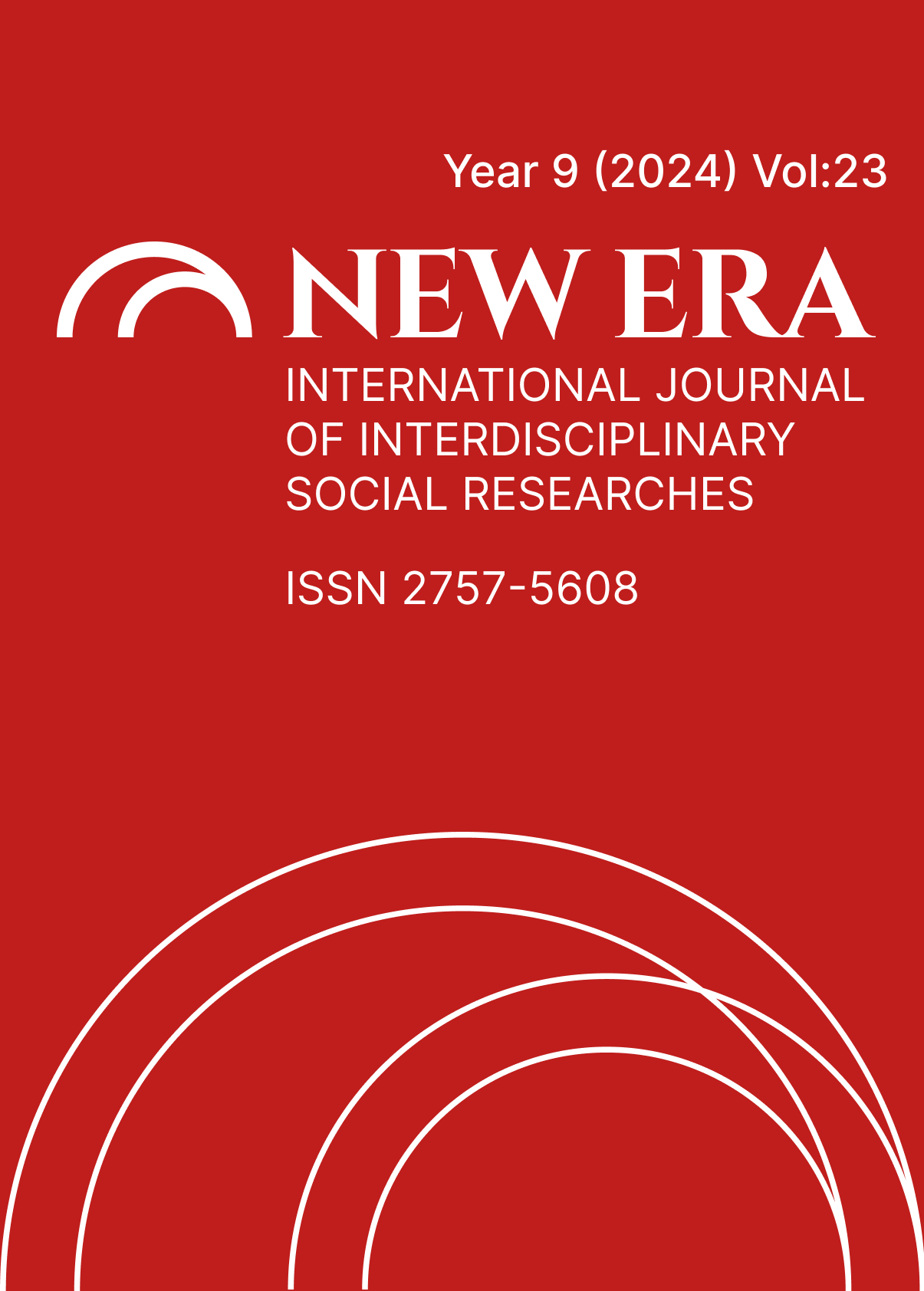THE 6 FEBRUARY EARTHQUAKES DESCRIBED AS THE DISASTER OF THE CENTURY REFLECTIONS OF ON EDUCATION AND TRAINING PROCESSES
DOI:
https://doi.org/10.5281/zenodo.11079924%20Abstract
On 6 February 2023, two major earthquakes, first in Pazarcık district of Kahramanmaraş with a magnitude of 7.7 and then in Elbistan district with a magnitude of 7.6, shook Turkey. The magnitude of the earthquakes, their successive occurrence and climatic conditions increased the magnitude of the disaster. The consequences of these two earthquakes will continue to have an impact in the long term. The fact that these events are one of the biggest natural disasters in the world in the last century has led to the common opinion that we are facing the biggest natural disaster in the history of the Republic. The earthquakes directly or indirectly affected 11 provinces, namely Adana, Adıyaman, Diyarbakır, Elazığ, Gaziantep, Hatay, Kahramanmaraş, Kilis, Malatya, Osmaniye and Şanlıurfa. While some of these provinces had major destruction, others had local destruction and all 11 provinces were included in the evaluation. Especially formal education was severely affected by such a devastation. Because thousands of buildings were destroyed or damaged as a result of the earthquake. It is likely that schools are among these buildings. Considering that a large part of the students and teachers were damaged by the earthquake, and losses of life or property occurred, we can say that educational institutions were also significantly negatively affected by the earthquake. In this context, the aim of the study is to reveal the reflection of the February 6 earthquakes, which deeply affected a large social area in our country, on educational processes. The study is a qualitative research. The study group of the research consists of 20 school administrators. The study group was determined according to the criterion sampling method. As a criterion, being a school administrator in any of the 11 provinces affected by the earthquake was taken as a criterion. The data of the study were collected with a semi-structured interview form. The data were analyzed by descriptive analysis method. According to the results obtained from the research findings, the February 6 earthquakes caused many negativities on education and training processes, especially forced migration, increased inequality of opportunity in access to education, and depressive disorders such as anxiety and stress overriding academic concerns. Considering these situations, it should be a priority to increase awareness trainings for the continuity of education and training both before and during disasters, and to provide psychological support for psychological recovery in order to normalize life for individuals as soon as possible.
References
AFAD (2014). Türkiye’de afet farkındalığı ve afetlere hazırlık. https://www.afad.gov.tr/kurumlar/afad.gov.tr/3923/xfiles/turkiye-afet-farkindaligi-ve-afetlere-hazirlik-arastirmasi_-2014-edited.pdf. adresinden 07.10.2023 tarihinde erişilmiştir.
AFAD (2018). Türkiye’de afet yönetimi ve doğal kaynaklı afet istatistikleri.
https://www.afad.gov.tr/kurumlar/afad.gov.tr adresinden 07.10.2023 tarihinde erişilmiştir.
Atalay, İ. (1998). Türkiye jeomorfolojisine giriş. İzmir: Ege Üniversitesi Edebiyat Fakültesi Yayınları.
Atalay, A. (2023). Afet Sonrası İç Göç ve Eğitimde Zincirleme Reaksiyonlar. Buca Eğitim Fakültesi Dergisi, 57, 1716-1734.
Dikmenli, Y., & Gafa, İ. (2017). Farklı eğitim kademelerine göre afet kavramı. Mehmet Akif Ersoy Üniversitesi Eğitim Fakültesi Dergisi, 44, 21-36
Gönüllü, E., & Tekin, H. G. (2021). Deprem sonrası göç eden ergenlerde gerilim tipi baş ağrısı: Kontrollü VCXXçalışma. İzmir Eğitim ve Araştırma Hastanesi Tıp Dergisi, 133-138.
Fan, F., Zhang, Y., Yang, Y., Mo, L., & Liu, X. (2011). Symptoms of posttraumatic stress disorder, depression, and anxiety among adolescents following the 2008 Wenchuan earthquake in China. Journal of Traumatic Stress, 24, 44-53. http://doi.org/cd8njg
Kirman, F. (2023). Deprem Sonrası Travmatik Stres Tepkileri ve Sosyal Medyada Yansımaları, Antakiyat, 6(1), 14-29.
Miles, M, B., & Huberman, A. M. (1994). Qualitative data analysis: An expanded Sourcebook (2nd ed). Thousand Oaks, CA: Sage.
Nipa, T. J., Kermanshachi, S., Patel, R., & Tafazzoli, M. (2020). Disaster Preparedness Education: Construction Curriculum Requirements to Increase Students’ Preparedness in Pre-and Post-Disaster Activities. In Associated Schools of Construction (ASC) International Conference.
Saban, A., & Ersoy, A. (2019). Eğitimde nitel araştırma desenleri. Ankara: Anı Yayıncılık.
Şahin, C., & Sipahioğlu, Ş. (2002). Doğal Afetler ve Türkiye. Ankara: Gündüz Eğitim ve Yayıncılık.
Solmaz, G., & Özel, A. (2012). Türkiye’de Deprem Tekrarlanma Zamanının Tahmini ve
Neotektonik Bölgelere Göre Depremselliğin Markov Zinciri ile İncelenmesi. Cankaya
University Journal of Science and Engineering, 9(2), 2.
Tanner, A., & Doberstein, B. (2015). Emergency preparedness amongst university students. International journal of disaster risk reduction, 13, 409-413. https://doi.org/10.1016/j.ijdrr.2015.08.007
Tawil, S. & Harley, A. (2004) Education and identity‐based conflict: Assessing curriculum policy for social and civic reconstruction. Education, Conflict, and Social Cohesion. Geneva: UNESCO International Bureau of Education.
Topsakal, C., Merey, Z., & Keçe, M. (2013). Göçle gelen ailelerin çocuklarının eğitim-öğrenim hakkı ve sorunları üzerine nitel bir çalışma. Uluslararası Sosyal Araştırmalar Dergisi, 6(27). 546–560.
Turhan, C. E. (2022). Deprem. İstanbul: Oncu Yöneticiler.
Xiang, Y., Wang, R., Jiang, Y., & Mo, L. (2016). Relationships among personality, coping style, and negative emotional response in earthquake survivors. Social Behavior and Personality: An International Journal, 44(3), 499-507. https://doi.org/10.2224/sbp.2016.44.3.499
Yıldırım, N. (2019). Problem nasıl oluşur? Araştırmanın ilk adımları. S. Turan (Ed.), Eğitimde araştırma yöntemleri (1. baskı) içinde (37-47). Ankara: Nobel Akademi.
Downloads
Published
How to Cite
Issue
Section
License
Copyright (c) 2024 NEW ERA INTERNATIONAL JOURNAL OF INTERDISCIPLINARY SOCIAL RESEARCHES

This work is licensed under a Creative Commons Attribution-NonCommercial 4.0 International License.


